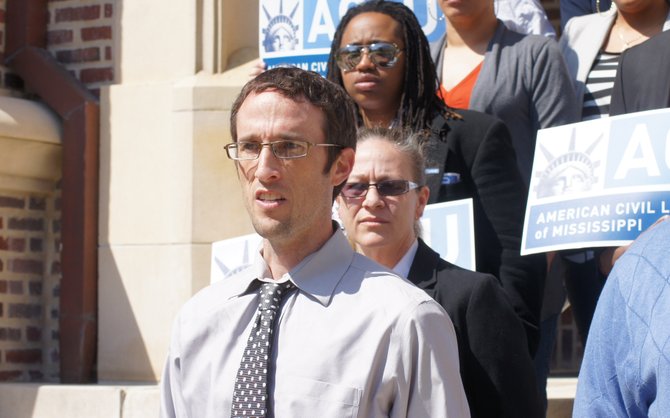Jed Oppenheim, a senior advocate at the Mississippi Southern Poverty Law Center, said "gross racial disparities" already exist when it comes to school punishment in the U.S. and in Mississippi. Photo by R.L. Nave.
If you let teachers and other staffers bring guns into schools, a kid is likely going to get shot. And based on past discipline practices at public schools in Mississippi, that kid will probably be black.
That's the argument Mississippi civil-rights organizations are making against a legislative proposal that sets aside $7.5 million for armed guards in public schools.
Jed Oppenheim, a senior advocate at the Mississippi Southern Poverty Law Center, said "gross racial disparities" already exist when it comes to school punishment in the U.S. and in Mississippi.
Oppenheim points to a 2012 report from the Civil Rights Project titled "Opportunities Suspended: The Disparate Impact of Disciplinary Exclusion from School."
The report shows that nationwide, 17 percent of African American children--about one in six--face school suspension at least once in their school career. This is compared to 5 percent of white students, 7 percent of Latinos, 8 percent of American Indians and 2 percent of Asian American students.
Black students also make up 70 percent of all school arrests, U.S. Department of Education data show.
These facts worry youth advocates in Mississippi, where schools have an equally poor track record when it comes to administering harsh discipline against black children.
On March 22, the U.S. Justice Department reached a deal with Meridian public schools, which the DOJ accused last year of operating a school-to-prison pipeline.
During its investigation, the DOJ found that African American public-school students in Meridian were five times more likely than whites to be suspended from classes and often got longer suspensions for the same offenses. Meridian's schools are about 86 percent African American.
Senate Bill 2659 would provide funding for school "resource" officers to police in and around primary and secondary schools. The House version of the bill would allow local school boards to develop safety policies to arm administrative employees and teachers. The policy would have to be submitted to the State Board of Education and Department of Public Safety and would authorize school superintendents to allow their employees to carry concealed weapons if they have the proper state permit.
Nsombi Lambright, communications director for One Voice, has a 15-year-old son, and said she believes he is more likely to be hurt by an armed guard or faculty member than an outside threat.
"The proposal to bring more armed guards into schools and to arm teachers is like a slap in the face to us, as advocates, and to those of us who are parents and aunts and mentors to young people in Mississippi schools," Lambright said at a press conference yesterday morning.
The Associated Press contributed to this report.



Comments